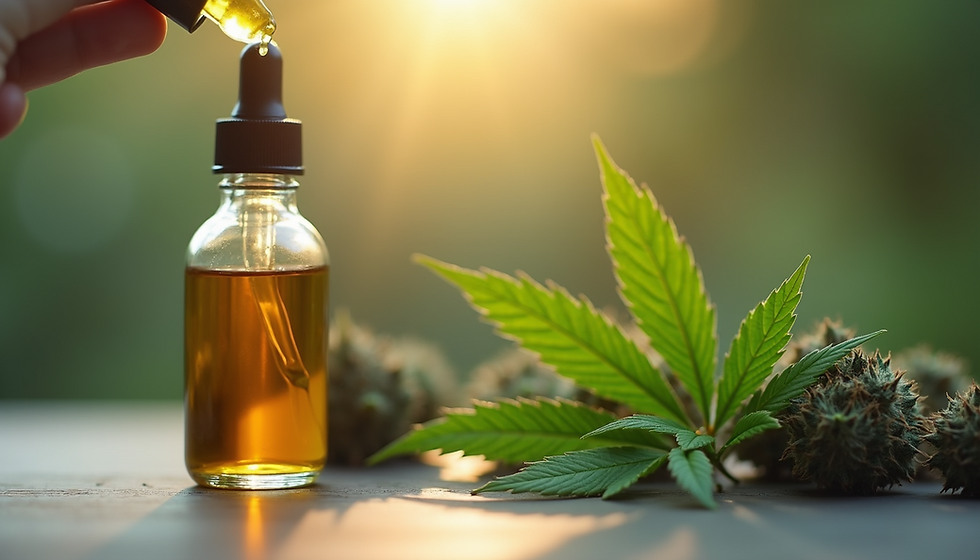Understanding the Safety of Cannabis for Seniors What You Should Consider Before Trying
- cannawannafl
- Aug 15, 2025
- 3 min read
As more people talk about cannabis and its potential benefits, seniors are showing increased interest. With many older adults exploring cannabis for various health issues, it's vital to weigh its safety. To help seniors make informed choices, let’s break down the essential factors they should consider before incorporating cannabis into their healthcare routine.
Understanding Cannabis and Its Potential Benefits
Cannabis is made up of many compounds called cannabinoids, with tetrahydrocannabinol (THC) and cannabidiol (CBD) being the most well-known. These compounds can interact with the body’s own endocannabinoid system, potentially leading to various health benefits.
For seniors, cannabis could help alleviate conditions commonly associated with aging. For instance:
Chronic Pain: Research shows that about 60% of seniors experience chronic pain. Cannabis may provide an alternative to opioids, which carry risks of dependency.
Anxiety and Depression: Studies indicate that over 20% of older adults face anxiety and depression. CBD oil has gained popularity for its calming effects without the high associated with THC.
Sleep Disorders: According to the National Sleep Foundation, nearly 48% of seniors report sleep disturbances. Cannabis may help improve sleep quality and duration, allowing seniors to rest better.
Medical Considerations for Seniors
Consultation with Healthcare Providers
Before trying cannabis, seniors should consult with their healthcare providers. Not every doctor may have extensive knowledge about cannabis, so finding someone who specializes in cannabinoid medicine can be helpful.
A healthcare provider can:
Review Current Medications: Cannabis can interact negatively with common medications for seniors, like blood thinners and certain antidepressants. Discussing these with a doctor is crucial.
Assess Individual Health Conditions: Understanding personal health can guide whether cannabis is safe and beneficial.
Dosage and Consumption Methods
Finding the right dosage is vital when using cannabis. Older adults may metabolize cannabis differently, affecting how they feel the effects.
Methods of consumption include:
Smoking or Vaporizing: These methods offer quick effects but may not be suitable for everyone, especially those with lung issues.
Edibles: These can take 30 minutes to 2 hours to show effects. Many seniors may accidentally take too much if unaware of their delayed onset.
A good approach is the "start low and go slow" method. Beginning with a small amount and gradually increasing can help avoid unwanted reactions.
Side Effects and Risks
Potential Side Effects
While many older adults find benefits in cannabis, it’s essential to recognize potential side effects. Common reactions include:
Dizziness: Especially after the first use, this can lead to disorientation.
Confusion or Memory Issues: Cognitive side effects may be more pronounced in those with existing conditions such as dementia.
It’s crucial for seniors to consider how these effects might impact their daily activities, like driving or operating machinery.
Fall Risks
Seniors face a heightened risk of falls when using cannabis. One study found that cannabis use can increase the likelihood of falling by up to 50%. Since falls can lead to serious injuries, creating a safe living environment is important. Removing tripping hazards and ensuring ample lighting can minimize risks.
Legal Considerations
State Regulations
The legal status of cannabis varies widely. In states where cannabis is legal, seniors might need a doctor’s recommendation for medical use.
Be aware of:
Limits on Quantity: Many states enforce limits on how much cannabis can be possessed.
Usage Locations: Some areas may have restrictions on where cannabis can be consumed.
Safety in Transportation
Transporting cannabis can lead to legal issues if not done correctly. Seniors should familiarize themselves with local laws regarding cannabis before traveling.
Moving between states? Understand that laws can differ drastically, and being informed can help avoid complications.
Social and Emotional Aspects
Breaking the Stigma
Seniors may still experience stigma regarding cannabis use. Understanding its medicinal potential can help combat this negative perception.
Finding supportive networks, such as local senior centers or cannabis advocacy groups, can foster a shared sense of community and facilitate discussions about its use.
Potential Isolation or Social Benefits
Cannabis could help some seniors feel more comfortable in social settings. For example, reducing anxiety can encourage more social interaction during gatherings. However, seniors might feel isolated if they sense negativity about cannabis in their social circles.
Connecting with understanding peers through support groups can help maintain social ties.
Final Thoughts
While cannabis may present promising benefits for seniors, it’s vital to approach its use with care and informed choices.
By consulting healthcare providers, staying updated on legal regulations, and being aware of potential risks, seniors can ensure a safer experience with cannabis. As research evolves, more seniors may find cannabis a valuable part of their health and wellness journeys.
Those considering cannabis should reflect on their health and preferences, leading to a more informed decision on whether it’s right for them. Just like any health decision, knowledge is power on the path to safely navigating this increasingly popular option.




Comments